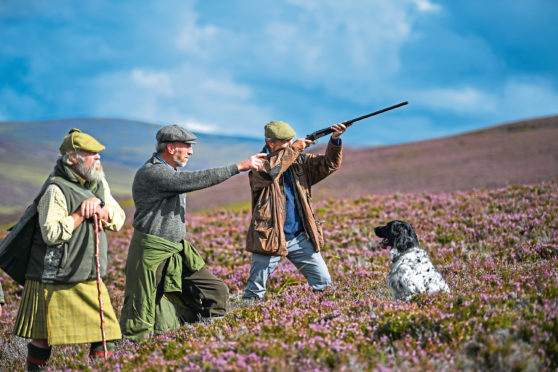Concerns have been raised that Scotland could be in for a less-than-Glorious Twelfth.
Experts fear the country could be facing one of its poorest grouse seasons in years as a result of recent weather conditions.
The long, cold winter, followed by one of the warmest, driest summers on record have combined to have a devastating effect on populations, said Bidwells property consultants.
The warning comes as estates gear up for the annual opening of the grouse shooting season on August 12.
Bidwells said gamekeepers were bracing themselves for a lean time.
“When the annual summer grouse counts commenced in early July there was a great deal of optimism for the 2018 season,” said Ralph Peters, the firm’s head of estate management.
“It came as something of a shock to then hear that even while grouse counts are continuing, the 2018 season looks likely to be poor across much of the country.”
Counts reviewed by Bidwells are showing a significant reduction in numbers of both young and old grouse in many areas.
Mr Peters added: “The cause of this decline is hard to pinpoint and there are any number of theories but undoubtedly, despite every effort by the gamekeepers, numbers have dropped due to the weather conditions.
“At the end of 2017 most grouse moor owners and keepers were happy with their stock of grouse, both in terms of numbers and condition.
“A long, harsh and particularly late winter followed resulting in the birds perhaps being in a poorer condition than hoped for nesting and in addition the young heather so vital for their diet was late coming through.
“Thus, when nesting commenced in April, and in some places later as a result of the snow, the hens were in poor condition, resulting in a lower number of eggs and the mothers struggling to look after those that hatched.
“There then followed the incredibly dry and hot summer, leading to a shortage of water on the hill and insect life for the young grouse to feed upon.
“Evidently both young and old grouse suffered and the early summer optimism turned to concern as it has become apparent that both the parent birds and their young have struggled.”
Lianne MacLennan of Angus Glens Moorland Group said: “Our game- keepers can manage the habitat, legally control the predators and monitor grouse health but there are times when you can’t beat the elements.
“This year seems to have been like that. The government will lose a lot of the tax revenue they get through shooting and, locally, this will mean fewer visitors at a time when the hotels and B&Bs get quieter.
“The beaters and pickers up will also go without seasonal employment, which is significant.
“The good thing is that grouse estates pay £23m into local businesses throughout the year, whether they get an income from the grouse or not, so that private investment will remain without any need for government support.”
Limited shooting is expected in some areas and Bidwells said a number of shoots had already been cancelled.
Bidwells warned the shortage would not only impact upon the grouse moors but on the wider rural economy, including lost bookings for hotels.
However, Mr Peters insisted the outlook was not all doom and gloom.
“Despite the considerable concern there are grounds for hope and optimism with a few reports of later, successful hatches of grouse that will aid the recovery of the birds going forward,” he said. “Grouse, like most wild birds, can bounce back pretty quickly given the right conditions.”
